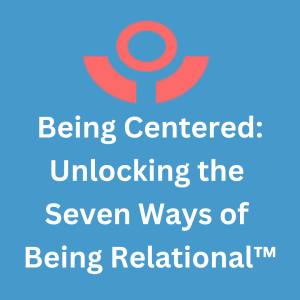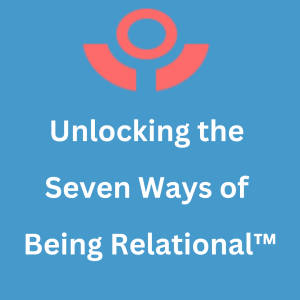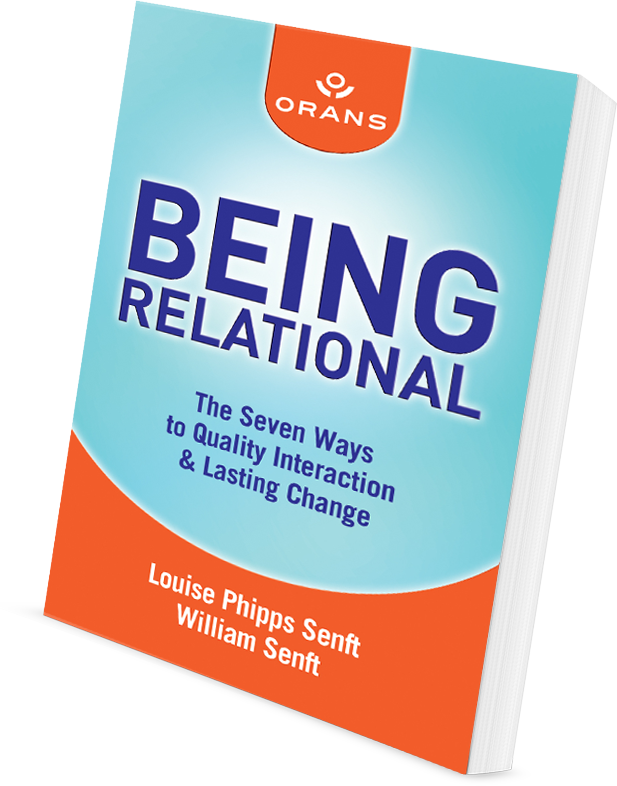
Being Centered Part 2: Unlocking the Seven Ways of Being Relational™


 Being Centered is fundamental to The Relational Approach ©, pioneered by Louise and Bill Senft through their mediation work over the past 30 years at Baltimore Mediation. Being centered is one piece of the puzzle of promoting quality dialog. The Relational Approach is not a linear process, but rather one that holds being engaged, being centered, grounded and clear all at the same time. Have you had the experience of feeling in harmony with others and within yourself? That is the essence of being centered. As a reminder, the Relational Mindset focuses on interactions that are natural and authentically oriented to connection with others, which empower and bring joy to you and others.
Being Centered is fundamental to The Relational Approach ©, pioneered by Louise and Bill Senft through their mediation work over the past 30 years at Baltimore Mediation. Being centered is one piece of the puzzle of promoting quality dialog. The Relational Approach is not a linear process, but rather one that holds being engaged, being centered, grounded and clear all at the same time. Have you had the experience of feeling in harmony with others and within yourself? That is the essence of being centered. As a reminder, the Relational Mindset focuses on interactions that are natural and authentically oriented to connection with others, which empower and bring joy to you and others.
What it feels like to be Centered
The feeling of harmony with others and within yourself is both within you, in your center, and around you in how you are with others. That feeling of being centered is a resource. Remember that feeling! Finding your center really begins with your body and your brain. I experience this “zone” in my transformative mediation work. I’m aware in the moment, as well as on a meta level, and able to see what is unfolding as if from above and am still able to surgically intervene at the same time in a way that parts the sea for clients, out of which emerges for them something unexpected, something intuitive, something said in the perfect meaningful way.
Nothing is quite so identified with the center of your being as your heart. When you are centered, your heart is calm, peaceful, strong, wise and expansive. Your heart will tell you when you are not centered. In conflict, you have an experience that is mental, emotional, and physical. The likelihood of your brain being hijacked in conflict is high and your ability to listen deeply and reflect, let alone your ability to be open to another when in a state of conflict is decreased dramatically.
Becoming aware of your reactions
As a physiological reality, it is very difficult to remain centered when your reactivity is triggered. But you can do it. Here’s a scenario to illustrate this point. Imagine yourself in a checkout line; you are in a bit of a hurry. Behind you, a mother is yelling at her crying 2 year old to behave. As she screams, you are aware this makes you feel uncomfortable. You may feeling embarrassed for her, judgmental or recalling incidents in your own life that are uncomfortably close. Aware of these thoughts, you take a breath. Fill your whole tank with fresh oxygen, a deep belly breath, and then exhale the energy attached to the thoughts, memories and triggers. Come back to center, to calm in the face of this storm. Your awareness of what is going on in your mind and in your body is the key starting point. Then, coming from a place of center, you might turn to the mother and say “Some days are hard with kids. Please take my place in line.” Being centered helped you to be relational by offering kindness.
Important learning: In the example above, your response from a place of center provides the pause for that mother where she might regain some oxygen for herself. And interacting in a relational way contributes to well-being for both you and the system. As for the mother, on the spot, she must meet her own strong emotions with a practiced skill of deep listening and reflecting. She could soothe her emotional reactions with deep calming breaths, which would also have a calming effect on her child. That calming distance can create a pause to consider the options. Relational negotiation begins with being centered. Engaged from a place of center creates well-being – relational reciprocity.
In Being RelationalTM, the first Four Ways of Being Relational, Being Engaged, Being Centered, Being Grounded and Being Clear, lead to quality dialogue and tend not to escalate conflict in an unhealthy way and are based in the relational theory of conflict on which Baltimore Mediation has based its work.
Try it at home: Much of being centered comes from the ability to calm the body, namely to calm your primitively instinctual monkey mind and your racing heart. One of the most ancient ways of doing so is by concentrating on your breath. This month, focus on how conflict feels – and your reactions. When an emotional overload begins, especially in conflict, concentrate on your breath and the flow of oxygen into your body.
Being Centered is being aware of your reactions and getting into the “flow” with your mind, body and heart. Next month in the Gazette, you can look forward to additional examples of Being Centered, including how to avoid Triangulating in your relationships. Learn more about this worldview in our book, Being Relational
 Being Engaged is a cornerstone of The Relational Approach ©, pioneered by Louise Phipps Senft and Bill Senft through their mediation work over the past 30 years at Baltimore Mediation. How can you become more engaged in your relationships and cultivate a Relational Mindset? As a reminder, the Relational Mindset focuses on interactions that are natural and authentically oriented to connection with others, which empower and bring joy to you and others, those you love and those you do not.
Being Engaged is a cornerstone of The Relational Approach ©, pioneered by Louise Phipps Senft and Bill Senft through their mediation work over the past 30 years at Baltimore Mediation. How can you become more engaged in your relationships and cultivate a Relational Mindset? As a reminder, the Relational Mindset focuses on interactions that are natural and authentically oriented to connection with others, which empower and bring joy to you and others, those you love and those you do not.
Being present means that you are physically, mentally, emotionally right there with another person. Yes, it takes effort. When you give your full attention, whether returned or not, in that moment, there is a quality of dignity and honoring of self and other; we are both important. We inhabit the same space, the same planet. It matters and, as we are beginning to understand through quantum physics, it shifts energy positively – relational reciprocity.
Being Engaged is being AttentivePart of being present, mentally and emotionally, in the sense of being there for others, is being attentive. Often, it’s easy to show up and then mentally check out and be somewhere else entirely. If you are automatically saying “no” or reflexively thinking “That’s ridiculous. Stupid. Here we go again,” you also are not attentive, and you are sowing the seeds of conflict with others in your lack of attention. When people feel dismissed, they will push back stronger, or go elsewhere to others to be against you.
When you are engaged with others, you make mental and emotional space for the other to enter your experience. You don’t analyze, interpret, or prepare to understand. As Stephen Covey suggests, you seek first to understand and then to be understood.
Being Engaged is Listening, Reflecting, and Asking Open QuestionsThree practices are key to effective communication: Relational Listening, Reflecting and Asking Open questions. All three are elegantly simple but can be hard to do. Here’s how. Listen attentively: suspend what you think, feel, and want to say. Be aware of your own impulses to either: agree with, align with, give advice to, or tell others what to do or not do, your impulse to disagree with, dismiss, or put them down. When you listen attentively, the other person will experience you in the way they most yearn for you to experience them: fully, as a human being. To this quality of listening, add a reflection. When the other person finishes their thought, reflect back both the facts and feelings they conveyed using their exact words, not yours. Why do this? It communicates that you are with them, by their side, neither behind them nor ahead of them, honoring their story and fostering their empowerment. To reflect another in this way allows that person to edit, to change, or to modify, or to retract what they were saying. It is a vehicle for clarity and understanding. Once the person has calmed down a bit or finished sharing their thoughts, ask an open question. “What else is important?” “What else do you want me to know or understand?” An open question is one that does not seek a particular answer or call for a yes or no response. It is not a leading question and does not steer the conversation. It seeks to understand. The yearning to be understood, and thus connected is deeply hard-wired in to our cellular structure and held by all human beings. The best part for you in choosing to be engaged is that you now have a much better chance that the other person will be able to listen to you.
Being Engaged is Being InterestedBeing engaged, present, and attentive involves adopting an open attitude That open attitude is based on curiosity and interest in other people, even in casual conversation. Being relational is attending to yourself AND others. When you are intentional, because we are committed to living relationally, interest in other people builds capacity through connection and civility. This attitude of curiosity will serve you even in difficult interactions, even when you feel someone is against you. When you are in that heated debate, pause and check in with yourself. Notice what is pounding or racing in your body and take a deep breath and center yourself. With self-awareness and purpose, offer your views and ask, “So what do you think about that?” “When you say that, I want to understand why it is important to you.” Suspend your judgment of other and remain open. Open to new information. Open to gaining better understanding of others. It’s being strong enough to be vulnerable, open, welcoming to others, even when our viewpoints are different or our interactions unpleasant.
Important learning: Relational listening isn’t just a skill. Like presence, it too is more of an attitude, one of curiosity and openness. Following these methods for Being Engaged is critical for quality interaction. But your ability to be engaged is very much affected by your ability to avoid being sidetracked by your reactivity and your habits in aligning with others.
In Being Relational™, the first Four Ways of Being Relational, Being Engaged, Being Centered, Being Grounded and Being Clear, lead to quality dialogue and tend not to escalate conflict in an unhealthy way, but to move towards and through conflict, and are based in relational conflict theory on which Baltimore Mediation has based its work for 30 years.
Try it at home: This month, focus your energies on Being Engaged in your interactions. Practice being physically and mentally present in your interactions while listening to understand rather than judge. Listen to others carefully with a curious outlook. Experiment with reflecting back both the facts AND the feelings conveyed in the other person’s own words – not yours. Ask open ended questions. See how this adjustment feels in the moment and how it impacts your relationships. It takes thoughtfulness and practice – it may not feel second nature at first.
Being Engaged is being present, attentive, listening, and interested. Next month in the Gazette, you can look forward to examples of Being Centered. Learn more about this worldview in our book, Being Relational. The Relational Approach © is a conscious and deliberate choice in how you can choose to interact with others. A Relational Mindset focuses on interactions that are natural and authentically oriented to connection with others, which empower and bring joy to you and others.
The Relational Approach © is a conscious and deliberate choice in how you can choose to interact with others. A Relational Mindset focuses on interactions that are natural and authentically oriented to connection with others, which empower and bring joy to you and others.
 Being Relational™. A Relational Approach infuses everything we do at Baltimore Mediation, at Blink of an Eye™ nonprofit and Blink of an Eye™ Podcast. But what does Being Relational mean? It’s a world view. It means you care about yourself and you care about others. And you believe that no one wants to be a victim or an oppressor. So you live your life making Relational Choices, mindful of your impact for well-being and for harm. Over the past 30 years, Billy and I have been immersed in the study of quality interaction and negotiation, teaching negotiation mediation, and facilitating as mediators and relational advocates while supporting others in their negotiations. It has brought us a unique perspective on how people relate to each other and how they find their way through very difficult times. We’ve learned that people have either a transactional or a Relational approach to their interactions with others and to their lives.
We start the discussion with a transactional approach, but not because that is what we want to teach. We begin there because it is most familiar to us in our highly competitive and transactional world. We start with a transactional approach so we can better understand a Relational approach, as we compare and contrast. A transactional approach centers on a scarcity mentality and a competitive approach. Make it fair, but may the best person win! Competition makes us better – the striving, the struggle, makes us stronger and smarter. Right? A transactional approach is power based, that is power over based. Those with more power, from whatever source, will win and can maximize their gain in dealings with others resulting in the greater and greater accumulation of power by those who have it.
Being Relational, by contrast, is a worldview that grounds people in conscious and deliberate choices. For many people, the processes of interactions are automatic, based on habits governing reactions (or lack thereof) to various situations. For many people living their lives on automatic from day to day, their learned behavior, influenced by the people and systems around them, is sleepy, and on autopilot, without conscientious thought. Being Relational wakes us up! We become more aware of our thinking, feeling and behavior and their cumulative impact on ourselves and others. Based on our research and experience, we believe there are seven ways of Being Relational:
Being Relational™. A Relational Approach infuses everything we do at Baltimore Mediation, at Blink of an Eye™ nonprofit and Blink of an Eye™ Podcast. But what does Being Relational mean? It’s a world view. It means you care about yourself and you care about others. And you believe that no one wants to be a victim or an oppressor. So you live your life making Relational Choices, mindful of your impact for well-being and for harm. Over the past 30 years, Billy and I have been immersed in the study of quality interaction and negotiation, teaching negotiation mediation, and facilitating as mediators and relational advocates while supporting others in their negotiations. It has brought us a unique perspective on how people relate to each other and how they find their way through very difficult times. We’ve learned that people have either a transactional or a Relational approach to their interactions with others and to their lives.
We start the discussion with a transactional approach, but not because that is what we want to teach. We begin there because it is most familiar to us in our highly competitive and transactional world. We start with a transactional approach so we can better understand a Relational approach, as we compare and contrast. A transactional approach centers on a scarcity mentality and a competitive approach. Make it fair, but may the best person win! Competition makes us better – the striving, the struggle, makes us stronger and smarter. Right? A transactional approach is power based, that is power over based. Those with more power, from whatever source, will win and can maximize their gain in dealings with others resulting in the greater and greater accumulation of power by those who have it.
Being Relational, by contrast, is a worldview that grounds people in conscious and deliberate choices. For many people, the processes of interactions are automatic, based on habits governing reactions (or lack thereof) to various situations. For many people living their lives on automatic from day to day, their learned behavior, influenced by the people and systems around them, is sleepy, and on autopilot, without conscientious thought. Being Relational wakes us up! We become more aware of our thinking, feeling and behavior and their cumulative impact on ourselves and others. Based on our research and experience, we believe there are seven ways of Being Relational: